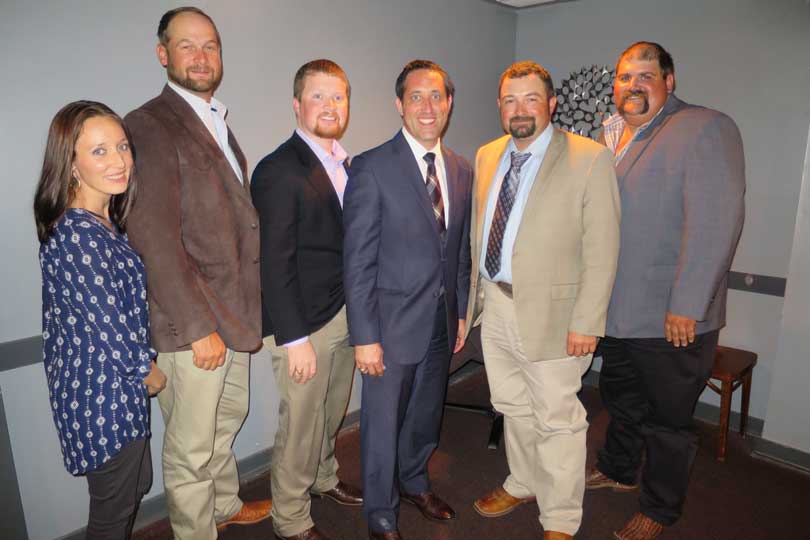By Justin Walker
Communications Specialist
Eminent domain, water and agricultural advocacy were a few of the topics discussed with Texas lawmakers and officials during the State Affairs Awards Trip last month.
“It’s good to meet these people who make these laws and tell them the importance of agriculture,” Rusk County Farm Bureau member Grant Davis said.
The group of young farmers and ranchers met with Gov. Greg Abbott, senators, representatives and state agency officials during the three-day event.
Meeting with lawmakers was a great opportunity for Texas Farm Bureau members to build relationships with their state representatives, Live Oak County Farm Bureau member Dane Elliott said.
“We deal with a lot of regulatory activities that are overseen by our state legislators and agencies,” Elliott said. “We need to have these relationships with our elected officials to help out all of our producers.”
Population growth was a recurring theme in the group’s discussion, and several leaders noted that roughly 70 percent of the state’s population lives in five counties—Bexar, Dallas, Houston, Tarrant and Travis.
The Lone Star State is growing at a rapid rate, Texas Comptroller Glenn Hegar said. The state gains about 1,100 new people every day—550 from natural growth and another 550 moving to the state. The latter is a testament to the economic impact Texas offers, according to Hegar.
“Texas is a good place to do business,” Hegar said. “It’s a stable regulatory environment. It’s a lower tax environment. People want to come for that economic opportunity.”
But that population increase brings several challenges, especially for agriculture.
Eminent domain reform remains a top priority as the next legislative session approaches, Rep. Abel Herrero said.
“The priorities are established by the speaker and the interim charges that we have,” he said. “One of those is eminent domain, making sure that the process is fair.”
Water, crop disease, property taxes, higher education, commodity prices, industrial hemp production and continued Hurricane Harvey recovery efforts were also highlighted during the event.
But a strong focus was placed on advocacy and engagement to cultivate a better understanding of agriculture for lawmakers and consumers.
“Seventy percent of the people in Texas live in five counties,” Rep. Tracy King, who chairs the House Agriculture and Livestock Committee, said. “They don’t understand our way of life. We have to do a better job of educating the masses about why farming is important.”
Part of that education and engagement begins in the Texas Legislature.
“We have a responsibility right now to make sure that agriculture has a foundation through policy and through community to make sure it exists in 20 years and for the next generation,” Rep. Mary Gonzalez said.
The issues facing farmers and ranchers impact the entire state, Sen. Charles Perry, who chairs the Senate Committee on Agriculture, Water and Rural Affairs, noted.
That’s why he strongly encouraged the young farmers and ranchers to stay active and connected with their elected officials and other groups and agencies who are involved in crafting legislation and regulations.
“Bringing farmers, ranchers and people in agriculture to meet with our representatives and senators puts a face to the cause,” Davis said. “When they see these laws come through from January until May, they are going to say, ‘This affects this person.’ I think putting a face to the issues is great.”
Agency officials from the Texas Animal Health Commission, Texas Water Development Board and Texas Parks and Wildlife Department also covered legislative issues with the group.
The State Affairs Awards Trip was held Sept. 19-21 in Austin.

